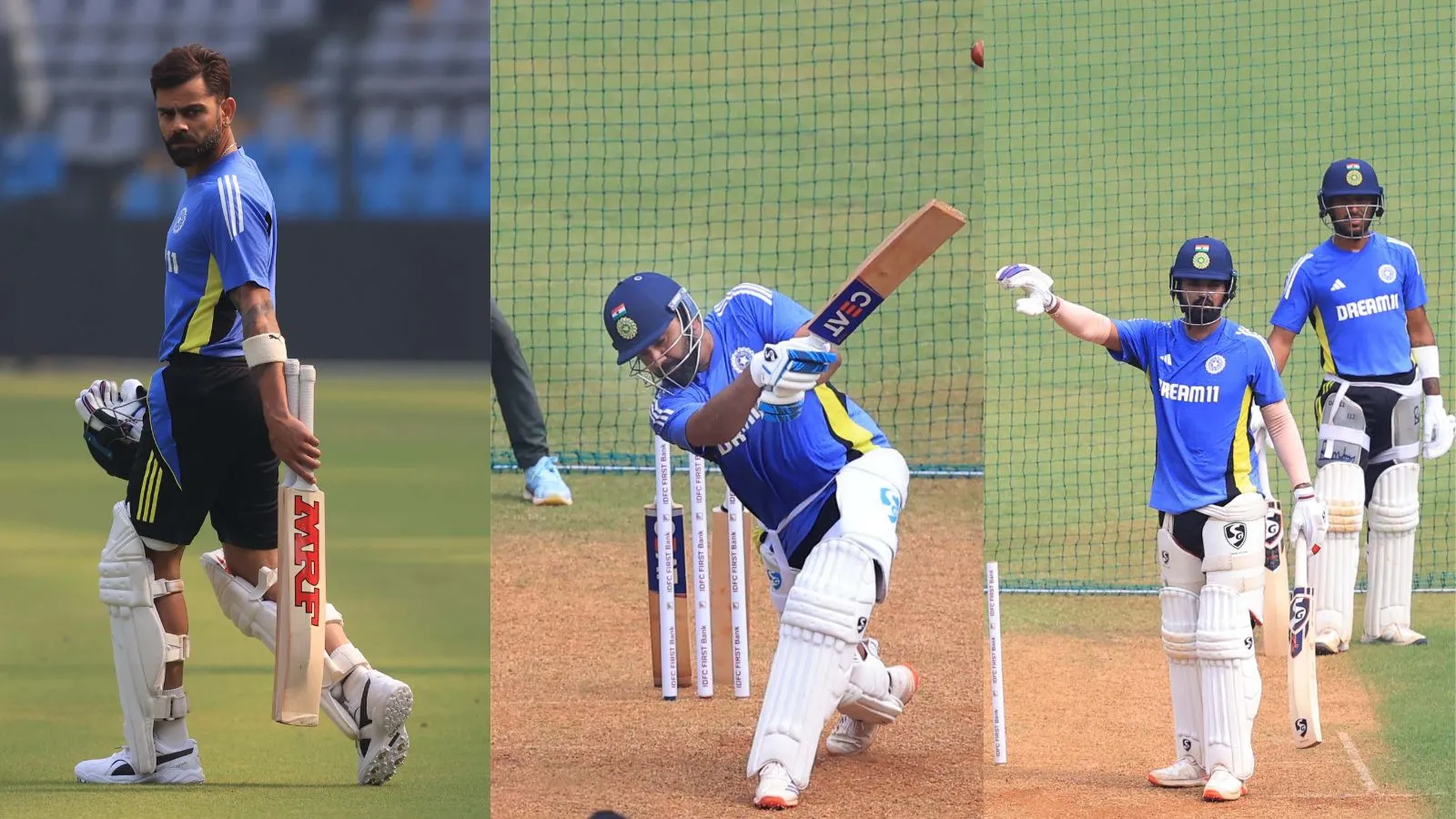When India’s nets session ended, the four practice pitches resembled ploughed fields. The footmarks of the studs formed incongruous patterns like modern tapestry on the ceilings. Clouds of red dust billowed when the ground-staff dusted the pitches before New Zealand came to practice. On white plastic chairs under giant umbrellas, India’s batsmen sat bathed in sweat, wiping the sweat and dust off the brows after two hours of relentless training, hopping from one net to the other, each surface of varying vintage, in pursuit of a collective resurrection before the examination Down Under.
The perplexing collapses — 46, 54/7 and 156 — have put them under stifling scrutiny. It’s true that they have been susceptible on turners in the last three years, but a series loss invariably amplifies the flaws and throws up questions. Like if the old guard of Virat Kohli and Rohit Sharma are on a gradual descent; whether KL Rahul has the resolve to crack the consistency code for all his redoubtable gifts; whether the young generation are equipped enough to inherit the heritage of Indian batting, whether they had misplaced their spin-destroying heritage. And importantly, can they put aside the failure and turn around before Australia’s well-worn attack comes hunting for them.
The turnover time between the series is horribly less. India finish the Mumbai Test latest by November 5 and 17 days later, they would find themselves in a different city, continent and hemisphere, on a different pitch and against a distinct group of bowlers. As though adjusting to those conditions are not daunting enough, landing there with shattered mind and self-doubts could make the tour long and arduous. For all the brave talks batsmen claim about putting bad days behind and approaching every match differently, they are humans with emotions. The failures would gnaw at the back of their minds. The only cure is runs, big runs, match-winning runs. But only two innings remain for redemption.

Express Photo by Amit Chakravarty 31-10-24, Mumbai
It infuses context to a dead-rubber game. India have a lot at stake, not just the points that would keep them in the World Test Championship race but a sturdy response from the batsmen, a return to their winning ways, a statement that the series loss was merely an aberration.
Series loss hurts: Gambhir
The hurt New Zealand inflicted still stings. Admitted head coach Gautam Gambhir: “The loss is obviously hurting, but it’s good that it’s hurting because it should hurt. Every time you lose a game, be it at home or be it away from home, it should hurt. That hurt will make us better.”
The nets, for the second day, lacked the usual joie de vivre. There was rage and angst, there was desperation and keenness to rediscover the touch and runs. Virat Kohli, his drought symbolic of India’s shortcomings, was purposeful in the nets. He rolled back the years, holding the net bowlers in mouth-gaping awe, as he pulled and cut with a furious energy. He batted in an impenetrable bubble, incisive with his foot work and judicious with the stroke-play. The leave of spinners was as conspicuous as the slap-cuts. The throwdown specialist Nuwan Seneviratne’s lightning reflexes prevented him from being smashed by a flat, full-throttle lofted on-drive of Kohli. There is beauty to Kohli’s labours to rekindle his golden touch. Whatever be the ailments that afflict his batting, he has not been sitting idle on his past exploits and waiting wishfully for his form to return. Rather, he has sought the refuge of the nets, his favourite sanctuary in Mumbai for the last two days.
Similar has been Rahul. He hit the nets on Tuesday and batted for nearly three hours with barely any break, largely working on his forward defence against the spinners. The next day, his primary focus switched the back-foot play versus the seamers. On Thursday, he spent a lot of time leaving the ball, resisting the fatal instinct to hang the ball outside the off-stump, which had gotten him into trouble in Bengaluru. He asked the ground-staff to draw two lines parallel to the stumps in front of the crease, so that he could gauge his movements.

Express Photo by Amit Chakravarty 31-10-24, Mumbai
On the adjacent pitch was Rohit, his atypical dismissal in the second innings in Pune perhaps tormenting him. He had jinked down the surface as he often does, missed the length and defended, only to thick-edge the ball which then hit the pads and went to the short-leg fielder. Such dismissals could be more commonplace here, as Wankhede surface would be bouncier than the one in Pune. So Rohit jumped out to every other ball and hoisted it to the stands, as though telling himself this was how he should have dealt Mitchell Santner. He is India’s most naturally destructive player of spin, but in his over-eagerness to impose himself on them, he has squandered his wicket. It could be a deliberate strategy to unsettle the spinners, but it has backfired. In this hour of distress, India would want the Rohit of the series against England and Australia, when a more mellowed brand of aggression fetched him runs.
To an extent, the young brigade of Yashasvi Jaiswal, Shubman Gill, Dhruv Jurel and Sarfaraz Khan have stood up, suggesting a smooth transition towards a post Kohli-Rohit era. But in Australia, India would want their three most experienced ones, with multiple tours to the shores in their logbook, to bat without baggages and burden, with runs in their account. Only two innings remain though, and they would hope that the slog on the practice nets at the Wankhede would yield them a rich harvest.



